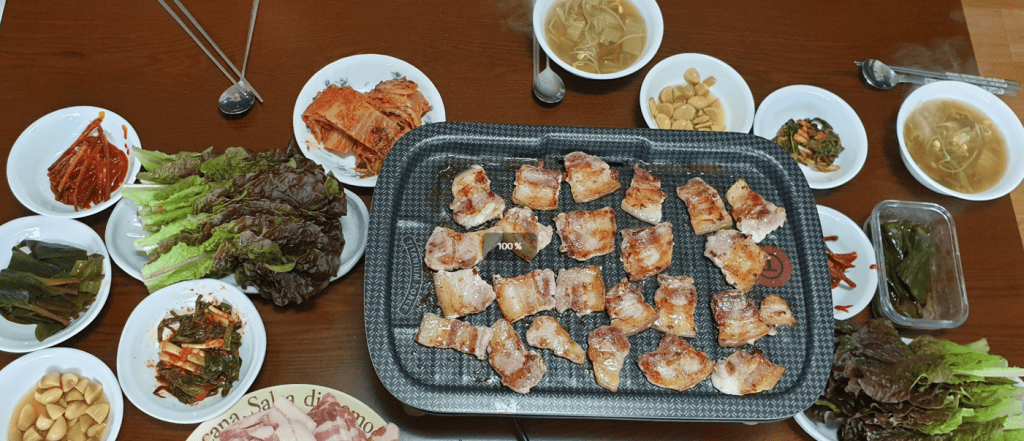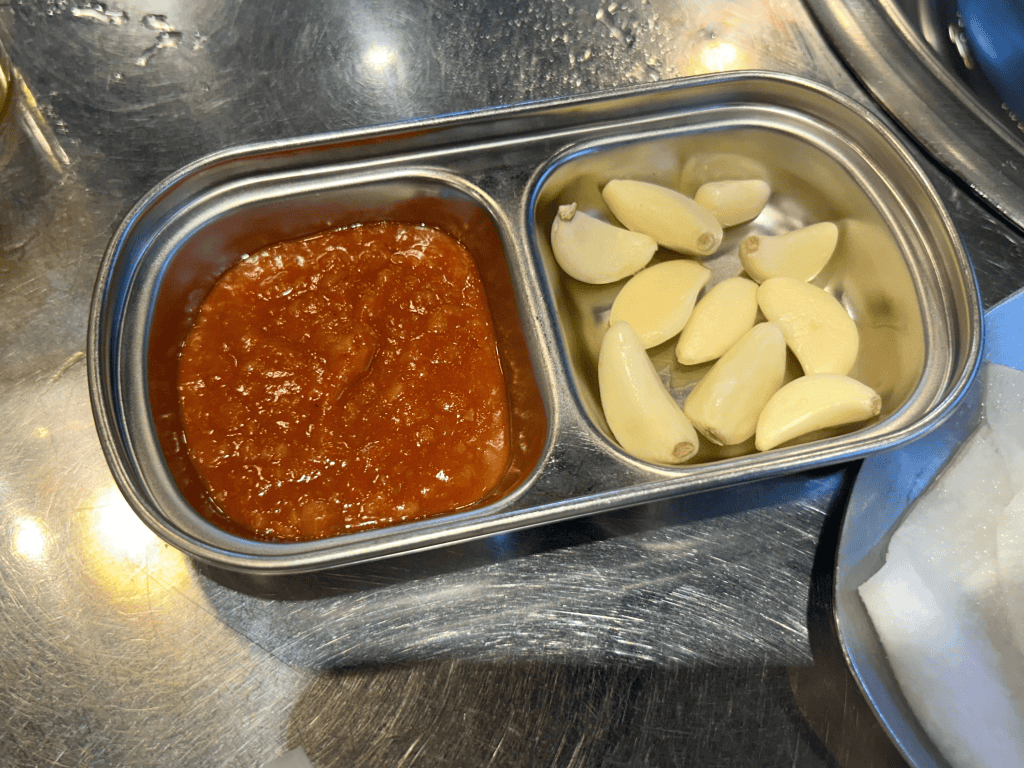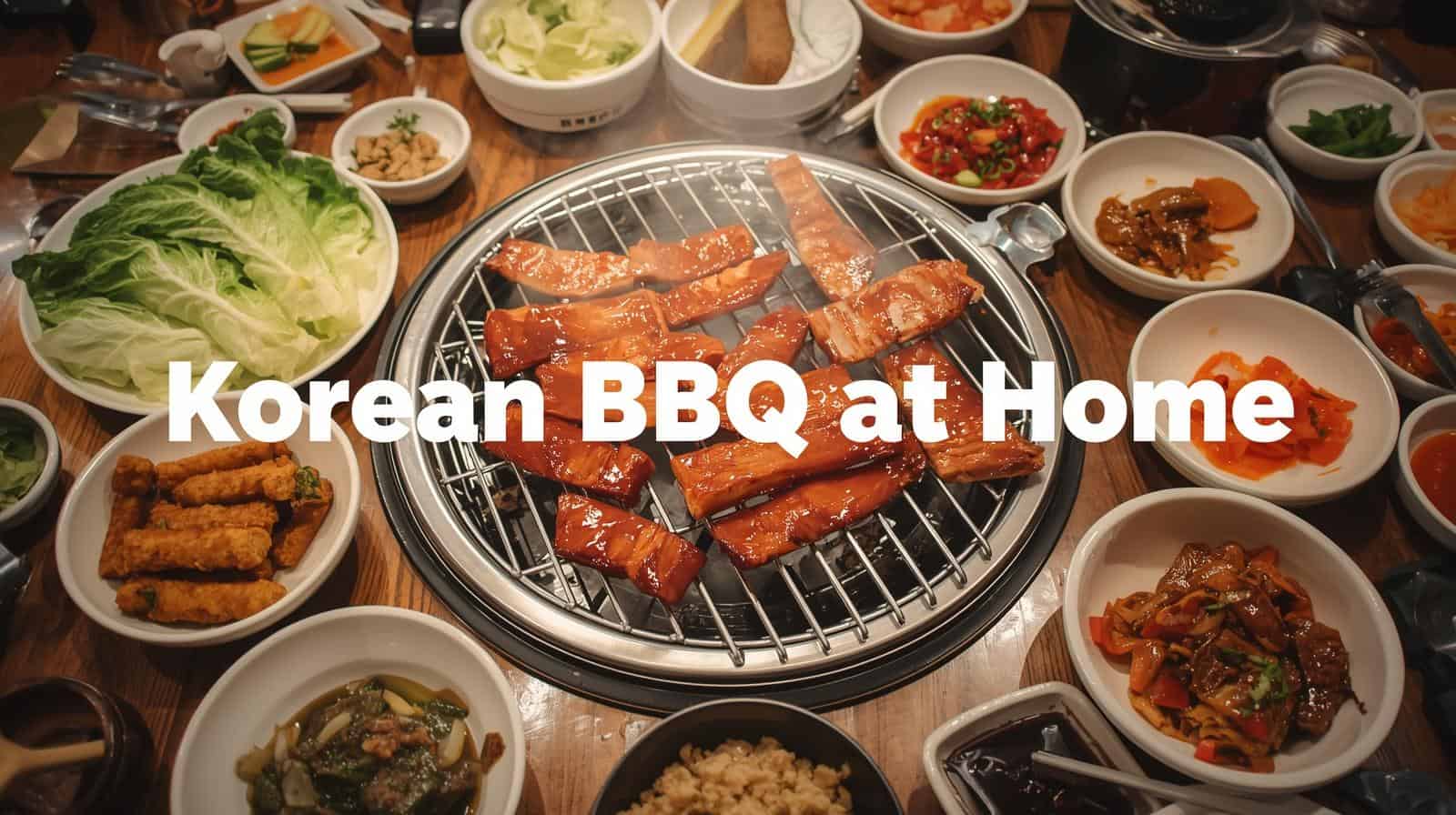The Joy of Korean BBQ at Home
Imagine the sound of meat sizzling on a hot grill, the aroma of garlic and sesame oil filling the air, and a table full of colorful side dishes ready to be shared. That’s the magic of Korean BBQ.
The best part? You don’t need to visit a restaurant in Seoul to experience it. With the right ingredients, tools, and a bit of know-how, you can recreate the lively, delicious atmosphere of Korean BBQ right in your own kitchen or backyard.

Essential Ingredients for Korean BBQ
Meats (Beef, Pork, Chicken)
- Beef (So-gogi): Popular cuts include ribeye, brisket, and short ribs (galbi).
- Pork (Dwaeji-gogi): Pork belly (samgyeopsal) is the superstar of Korean BBQ.
- Chicken (Dak-gogi): Often marinated in spicy sauces for extra kick.

Marinades and Seasonings
Korean BBQ flavors come alive with marinades. Bulgogi uses a sweet soy-based marinade with garlic and pear, while spicy pork bulgogi (dwaeji bulgogi) uses gochujang. Sesame oil with salt and pepper is the simplest but most loved dipping sauce.
Vegetables and Side Dishes (Banchan)
No Korean BBQ is complete without side dishes. Kimchi, pickled radish, seasoned spinach, and soybean sprouts are the most common. Fresh lettuce leaves and perilla leaves are used for wrapping grilled meat.
Tools and Setup You’ll Need
Grill or Pan Choices
You don’t need a fancy setup to enjoy Korean BBQ at home. A simple non-stick grill pan works perfectly on a stovetop. If you want a more authentic feel, portable gas grills or electric tabletop grills are excellent choices. Cast iron pans also add that smoky sear to the meat.

Serving Style and Table Setup
The beauty of Korean BBQ is the interactive dining style. Place the grill in the center, surround it with small bowls of side dishes (banchan), and keep sauces within easy reach. Everyone can cook their own meat and make wraps at the table.
Step-by-Step Guide to Cooking Korean BBQ
Preparing the Meat
- Slice beef or pork thinly for quick cooking.
- Marinate meat (if needed) a few hours in advance.
- Keep everything refrigerated until grilling.

Cooking and Grilling
- Heat the grill or pan until hot.
- Place the meat slices and let them sizzle. Don’t overcrowd the grill.
- Flip once for even cooking.
- Add garlic, onions, or mushrooms on the side for extra flavor.
Building the Perfect Ssam (Lettuce Wrap)
- Take a fresh lettuce or perilla leaf.
- Add a piece of grilled meat.
- Top with rice, a dab of ssamjang, and maybe a slice of garlic or kimchi.
- Wrap it all up and eat in one bite.

Must-Have Side Dishes and Sauces
Kimchi and Pickled Vegetables
Kimchi is non-negotiable at a Korean BBQ table. Add pickled radish, cucumber kimchi, or seasoned spinach for freshness.

Ssamjang and Dipping Sauces
Ssamjang (spicy soybean paste with garlic and sesame oil) is the soul of a perfect wrap. Sesame oil with salt and pepper is also a classic dipping sauce.

Pairing Drinks with Korean BBQ
Korean BBQ pairs wonderfully with drinks.
- Soju: Korea’s iconic clear spirit, perfect with grilled pork belly.
- Beer (Maekju): Light lagers balance the richness of BBQ.
- Makgeolli: Traditional rice wine with a milky flavor.

Tips for Hosting a Korean BBQ Night at Home
- Prepare meats and banchan ahead of time.
- Keep plenty of lettuce, rice, and sauces on the table.
- Encourage guests to make their own wraps.
- Play K-pop music or stream a Korean show for fun vibes.
- Don’t forget napkins – BBQ can get messy, and that’s part of the charm!
Bringing the Korean BBQ Experience Anywhere
Korean BBQ is about more than just food – it’s about sharing moments, laughter, and flavors. Whether you’re cooking in your kitchen, on a balcony, or even outdoors, you can bring the magic of Korean BBQ anywhere.
Once you’ve tried it at home, you’ll realize it’s not just a meal – it’s an experience worth repeating.

Leave a Reply